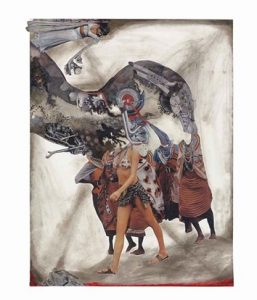
Wangechi Mutu
Kenyan
Face Walker
2011
Acrylic, watercolor, ink and printed paper collage on paper
New York
Mutu mixes daily objects in her collages to comment on consumerism and the environment, urging for the upcycling of objects into something new rather than discarding them. Face Walker depicts three views of women: a traditional woman, a housewife, and a modern woman. Mutu works out the relationship between these three identities through the lens of postcolonial narratives to revise the histories of women’s domestic culture and creative expressions (Smith, 2009). Mutu prefers collages because they allow her to combine conflicting elements into a harmonious understanding of race, gender, and beauty (Mutu and Schoonmaker, 2013). Mutu argues that the female body becomes a political weapon to confine women to being invisible, without a face, or being an object, like a motorcycle. Face Walker implies that every woman has all three identities and has the potential to empower herself to become who she wants to be (Willis, 2014).
References:
- Mutu, Wangechi and Schoonmaker, Trevor. Wangechi Mutu: A Fantastic Journey. (Durham NC: Nasher Museum of Art. 2013).
- Smith, Nicole R. “Wangechi Mutu: Feminist Collage and the Cyborg.” Ernest G. Welch School of Art and Design Theses Scholar Works, Georgia State University, 2009.
- Willis, Deborah. “Wangechi Mutu Interview.” BOMB Magazine, 24 Sept. 2014, bombmagazine.org/articles/wangechi-mutu/.

